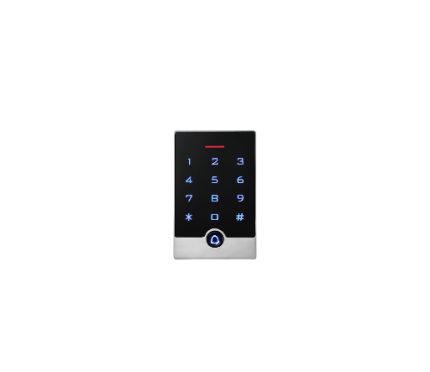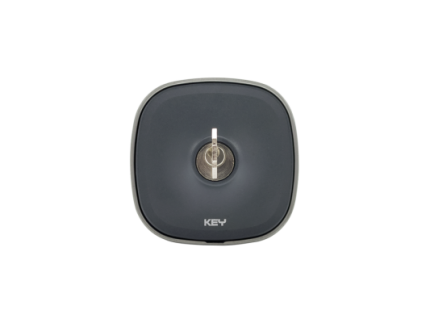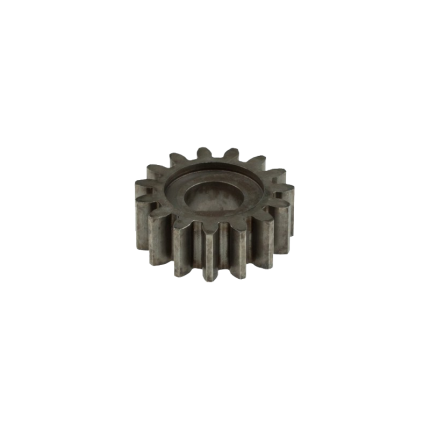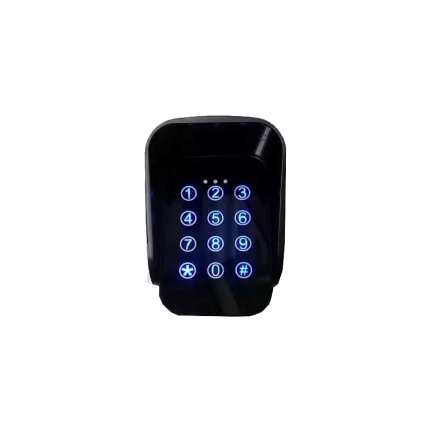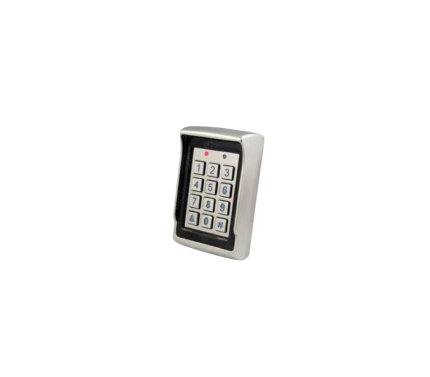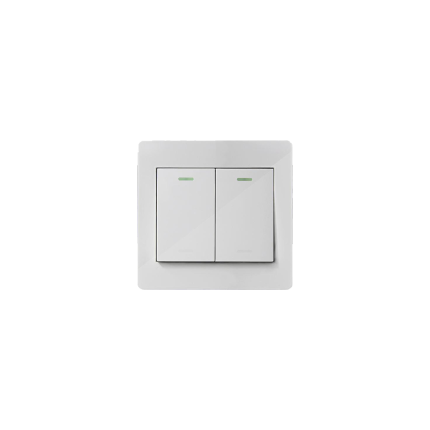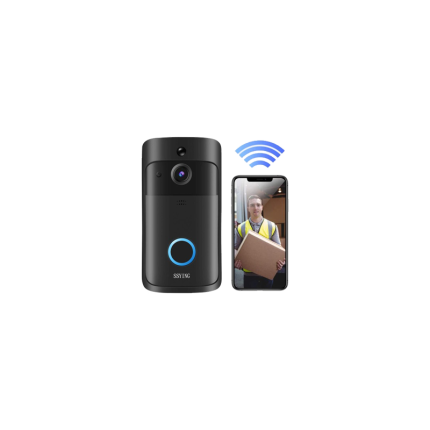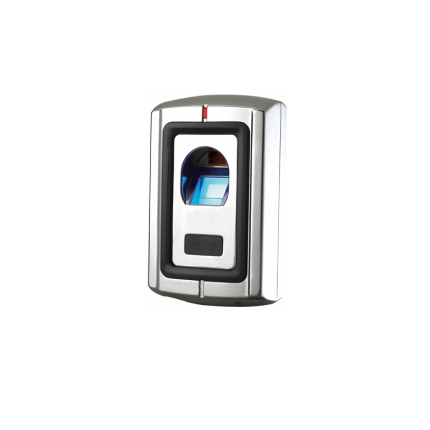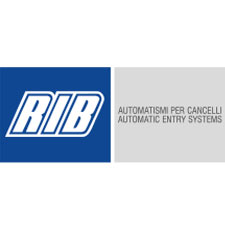Royal gates
Safety sensor VEDO180
Ship or pick up from our office.
Safety sensor VEDO180
*NO/NC *AC/DC 12-24 V *Receiving Range: 25 Meters *IP 44Keypad Access Control K155ST15
Ship or pick up from our office.
Keypad Access Control K155ST15
*Rain Shield Cover included *EM/ID card/tag reader *Finger Touch *Backlight *2000 Users *DC 12 V *IP 67 (Waterproof) *Doorbell button This unit is a standalone access controller or a Wiegand output keypad/card reader suitable for mounting indoors or outdoors, even in harsh environments. It features a sturdy, vandal proof Zinc Alloy electroplated case available in bright silver or matte silver finishes. The electronics are fully potted, ensuring durability. With support for up to 2000 users in Card, PIN, or Card + PIN configurations, this unit is ideal for small shops, domestic households, as well as commercial and industrial applications such as factories, warehouses, laboratories, banks, and prisons. Key Features- Waterproof: IP68 rated for outdoor use
- Material: Strong Zinc Alloy Electroplated anti vandal case
- User Capacity: 2000 users, supports Card, PIN, Card + PIN
- Adjustable Timers: Door output time, Alarm time, Door Open time
- Short Circuit Protection: Lock output current short circuit protection
- Built in Features: Light dependent resistor (LDR) for anti tamper, built in buzzer
- LED Status Indicators: Red, Yellow, and Green LEDs display the working status
- Operating Voltage: DC 12V ±10%
- User Capacity: 2000
- Card Reading Distance: 3 6 cm
- Active Current: < 60mA
- Idle Current: 25 ± 5mA
- Lock Output Load: Max 3A
- Alarm Output Load: Max 20A
- Operating Temperature: 45 60
- Operating Humidity: 10% 90% RH
- Adjustable Door Relay Time: 0 99 seconds
- Adjustable Alarm Time: 0 3 minutes
- Wiegand Interface: Wiegand 26 bit
- Size: 120 x 76 x 23mm
- Wiring Connections: Electric Lock, Exit Button, External Alarm, External Reader
Key selector -Key Automation EGS101
Ship or pick up from our office.
Key selector -Key Automation EGS101
The EGS101 is a gate/door opener key selector manufactured by KeyAutomation. It's designed for high-security residential and commercial properties and allows manual operation of automatic gates or doors using a physical key, according to KeyAutomation.A key selector for gates is a physical switch, often a key-operated switch, that allows manual operation of an automatic gate or door.
It's a security feature and backup system for situations where automated control is unavailable or undesirable.
TECHNICAL FEATURES
| Voltage | Vdc | Max 48 |
| Degree of protection | IP | 55 |
| Dimensions (L - D - H) | mm | 79 - 23 - 79 |
| Item | kg | 0,335 |
| Minimum operating temperature | °C | -20 |
| Max operating temperature | °C | +55 |
A key selector for door openers is a switch that allows you to operate an automated door or gate using a physical key, often as an alternative or backup to other access methods like remote controls or keypads.
These switches are commonly used in situations where you need to control access to a gate, garage door, or other automated barrier.
-
Function:Key selectors are designed to activate the door or gate opener's motor by completing an electrical circuit when the key is turned.
-
Mechanism:They typically involve a key cylinder that, when turned, activates a set of electrical contacts.
-
Applications:They are used in various settings, including residential, commercial, and industrial applications, such as garage doors, gates, and automatic doors.
-
Features:Some key selectors offer multiple functions, like automatic, lock, exit, and hold-open modes.
-
Types:They can be found as jamb key switches for garage doors or as more sophisticated selector switches for automatic doors with multiple functions.
Keypad – K180SC103
Ship or pick up from our office.
Keypad - K180SC103
*EM/ID card/tag reader *Shock resistance *Anti-vandal Metal shell *Backlight *1000 Users *DC 12 V *IP 67 *Doorbell *Rain Shield Cover included The Keypad - K180SC103 is an access control keypad typically used for security systems, gate openers, or door entry systems. 🔑 It's designed to allow access by entering a digital code. Here's what we know about it: Functionality:- Code-Based Access: The primary function is to grant access when a correct digital code is entered.
- Security System Integration: It's likely part of a larger access control system, where it sends signals to a control panel or hub to manage entry.
- Applications: Commonly found in residential or commercial settings for controlling gates, garage doors, and electronic door locks.
- Relay Output: It features a relay output with a maximum contact of 15A/120VAC & 10A/30VDC, offering two modes: toggle click and self-hold. This allows it to control various devices, including lights, automatic feeders, and water pumps.
- Weatherproof (IP44): This rating suggests it can withstand certain outdoor conditions, making it suitable for gate or outdoor door applications.
- Timer Function: In self-hold mode, you can set a timer to adjust the working time of the connected device.
- Dimensions: Approximately 24 × 18 × 12 cm.
- Weight: Around 0.8 kg.
Sliding gate operator gear
Ship or pick up from our office.
Sliding gate operator gear
A sliding gate operator gear refers to the toothed gear or rack and pinion system that facilitates the movement of a sliding gate.
This system typically consists of a toothed metal bar (the rack) attached to the gate and a motorized pinion gear that engages with the rack, causing the gate to slide open and closed.
Here's a more detailed explanation:
-
Rack:This is a toothed bar, usually made of steel or nylon-reinforced steel, mounted along the bottom of the sliding gate.
-
Pinion Gear:This gear is connected to the motor of the gate operator. When the motor rotates, the pinion gear engages with the rack's teeth, causing the gate to move.
-
Operation:The rotation of the pinion gear drives the gate along the track, either opening or closing it, depending on the direction of rotation.
-
Materials:While some racks are made of all-metal, nylon racks with a steel core are popular due to their lightweight nature, durability, and resistance to rust and wear.
Wireless Keypad Access Control KW200
Wireless Keypad Access Control KW200
*Backlight *433 MHz *Finger Touch *Rain coverWireless keypad access control systems replace traditional keys with a digital PIN code entry for building access, eliminating the need for physical keys and enhancing security.
These systems often include features like remote management via smart devices, audit trails of access events, and integration with other security systems like intercoms.
Here's a more detailed breakdown:
Core Functionality:
-
Keyless Entry:Users enter a unique PIN code into a keypad to unlock a door or gate.
-
Wireless Communication:The keypad communicates wirelessly with a receiver or controller, eliminating the need for extensive wiring.
-
Remote Management:Many systems allow administrators to manage access permissions, view audit trails, and adjust settings remotely via a smartphone app or computer.
-
Integration:Some systems can integrate with intercoms, surveillance cameras, and other security components for a more comprehensive solution.
Key Features:
- PIN Codes: Users are assigned unique PIN codes for entry.
- Proximity Cards/Fobs: Some systems also support access via proximity cards or fobs for users who prefer that method.
- Audit Trails: The system can record and store data about who accessed the door, when, and how, providing a valuable security record.
- Weatherproof and Durable: Many outdoor keypads are designed to withstand harsh weather conditions and vandalism.
- Backlit Keypads: Backlit keypads make it easier to use the system in low-light conditions.
Types of Wireless Keypad Access Control:
- Stand-Alone Systems: These systems are self-contained and don't require connection to a central system.
- Integrated Systems: These systems are part of a larger access control or building management system.
- Wired and Wireless Hybrid: Some systems combine wired and wireless components for added flexibility.
Benefits:
- Enhanced Security: Eliminates the risk of lost or stolen keys.
- Increased Convenience: Users don't need to carry keys.
- Improved Auditability: Tracks access events for security monitoring.
- Remote Management: Allows for easy administration and control.
Keypad Access Control K170S300A
Keypad Access Control K170S300A
*Rain Shield Cover Included *Waterproof Version *EM/ID card/tag reader *Backlight *DC 12 V *Shock resistance *Anti-vandal Metal shell *Doorbell Button Wiegand Output: Equipped with a Wiegand output for seamless integration with a controller. Multiple Access Modes: Offers Card, PIN, or Card + PIN options, providing versatile access control methods. Durable Metal Case: Housed in a robust Zinc Alloy electroplated case, ensuring durability and vandal resistance. RFID Key Fob Duplicator Attribute-Based Access Control Vs Role-Based Access Control 1,000 User Capacity: Supports up to 1,000 users, ideal for large-scale access control in commercial and industrial settings. Backlight Keypad: Features a backlight keypad for easy operation in low-light conditions.Description
1000 Users Metal Case 125KHZ RFID Card Keypad Access Controller with Backlight Door Control Independent Code Access Device
Description
Single door multifunction standalone access controller or a Wiegand output keypad or card reader.
It is suitable for mounting either indoor or outdoor in harsh environments.
It is housed in a strong, sturdy and vandal proof Zinc Alloy electroplated case which is availabl in either a bright silver or matt silver finish.
Metal Case&Waterproof .Supports up to 1000 users in either a Card, 4 digit PIN, or a Card + PIN option.
The inbuilt card reader supports125KHZ EM cardsLock output current short circuit protection, Wiegand output , and a backlight keypad.
Ideal choice for door access not only for small shops and domestic households but als for commercial and industrial applications such as factories, warehouses, laboratories, banks and prisons.
Features
Simple Programming, Easy Operatio
Adopt function steady card reader of block
Keypad Locks for 30 Seconds After 10 False Entrie
Can be Connected with Door-open Button and Doorbel
Non-volatile Memory in Power Failure
Tamper Switch can be Connected to Security Alarm System
Backlight key
Wiegand 26 output for connection to a controller
Support 1000Users
Keypad Access Control K280S6
Keypad Access Control K280S6
*Rain Shield Cover included *Backlight *DC 12-24 V *EM/ID card/tag reader *2000 Users *Doorbell *Shock resistance *Anti-vandal Metal shell *IP67Keypad access control is a security system that uses a keypad to restrict entry to authorized individuals by requiring them to enter a specific code.
Instead of physical keys, users input a PIN or code on the keypad, and if the code is correct, the system unlocks the door or gate.
Here's a more detailed explanation:
How it works:
-
Keypad:A keypad, typically with numbered buttons, is installed at the entry point.
-
Code Entry:Users enter a pre-defined code on the keypad.
-
Access Granted:If the code matches the system's records, the door or gate is unlocked, granting access.
-
Security:Keypad access control systems offer a higher level of security than traditional locks and keys, as codes can be changed and managed more easily.
-
Convenience:They provide keyless entry, eliminating the need to carry physical keys or fobs.
-
Integration:Keypad systems can be integrated with other security systems, such as access control panels or alarm systems.
Types of Keypad Access Control:
-
Standalone:These systems are self-contained and don't require external software or computers.
-
Networked:These systems are connected to a network, allowing for centralized management and reporting.
-
Integrated:Keypads can be part of a larger access control system, often combined with other methods like RFID cards or biometrics.
Common Applications:
-
Residential Buildings:Keypads can be used for entry into apartment buildings, condos, or individual units.
-
Commercial Buildings:Keypads are used for access control in offices, retail stores, and other businesses.
-
Industrial Facilities:Keypads can control access to restricted areas in factories and warehouses.
-
Gates and Barriers:Keypads can be used to control access to parking lots, garages, or other gated areas.
Benefits of Keypad Access Control:
-
Enhanced Security:Keypads provide a secure way to manage access, reducing the risk of unauthorized entry.
-
Increased Convenience:Keyless entry eliminates the hassle of carrying keys.
-
Scalability:Keypad systems can be easily scaled to accommodate changes in access requirements.
-
Cost-Effectiveness:Keypad systems can be a cost-effective solution for access control, especially when compared to more complex systems.
Smart Video Doorbell
Ship or pick up from our office.
Smart Video Doorbell
*WiFi connection *Android/IOS app on the smartphone *Answer visitors using smartphone worldwideFingerprint Access Control
Ship or pick up from our office.
Fingerprint Access Control
A fingerprint access control system is a security system that uses an individual's unique fingerprint to grant or deny access to a physical space (like a building or a room) or a digital system. It's a type of biometric access control, which relies on distinct biological traits for identification. How it Works The process generally involves two main steps:- Enrollment: When a user is first set up in the system, a fingerprint scanner captures an image of their fingerprint. This image is then converted into a digital template (a mathematical code, not an actual image) and securely stored in a database. This template represents the unique characteristics of that person's fingerprint, such as ridge endings and bifurcations.
- Verification: When someone tries to gain access, they place their finger on the scanner again. The system captures a new image, converts it into a template, and then compares it to the stored template in the database. If there's a match, access is granted; otherwise, it's denied. This entire process is typically very fast.
- Fingerprint Reader/Scanner: The device that captures the fingerprint image.
- Communication Network: To transmit the captured data to the database.
- Database: Where the digital fingerprint templates are stored.
- Management Software: For administering users, permissions, and logging access events.
- Electronic Door Locks: Locks that are controlled by the system, opening when access is granted.
- Power Supply: To power all the system components.
- Enhanced Security: Fingerprints are unique to each individual and are extremely difficult to replicate or steal, making them more secure than traditional keys, cards, or PINs.
- Convenience: Users don't need to carry keys or remember codes, as their fingerprint is always with them.
- Improved Accountability: Every access event is tied to a specific individual, creating clear and accurate audit trails.
- Reduced Risk of Lost/Stolen Credentials: There are no physical keys or cards to be lost, stolen, or shared.
- Cost-Effective in the Long Run: While there might be an initial investment, it can save money by eliminating the need for replacing lost cards or rekeying locks.
- Physical Contact Required: Most fingerprint scanners require direct contact, which can be a hygiene concern and may not work if fingers are dirty, wet, or injured.
- Potential for Recognition Issues: Scars, calluses, or even minor cuts can sometimes make it difficult for the system to recognize a fingerprint, leading to false rejections.
- Enrollment Time: Registering each user's fingerprint can be time-consuming in large organizations.
- Spoofing Concerns: While difficult, advanced techniques could potentially "spoof" a fingerprint. Modern systems often include "liveness detection" to counter this.
- Not Ideal for Visitors: It's not practical to enroll temporary visitors for short-term access.
- Optical Scanners: Capture a visual image of the fingerprint using light.
- Capacitive Scanners: Use electrical current to create an image of the fingerprint's ridges and valleys.
- Ultrasonic Scanners: Use sound waves to create a 3D map of the fingerprint.
- Thermal Scanners: Detect temperature differences between the ridges and valleys.
- Touchless Fingerprint Readers: Some newer systems allow for contactless scanning, often using 3D imaging of multiple fingers.


